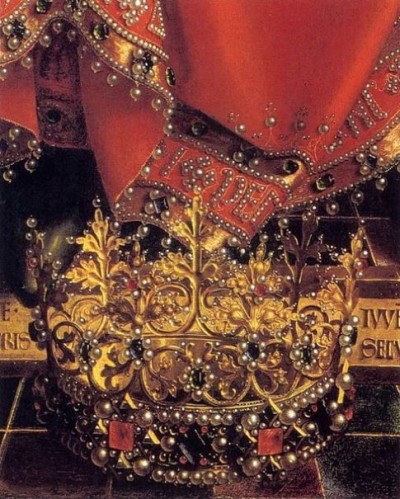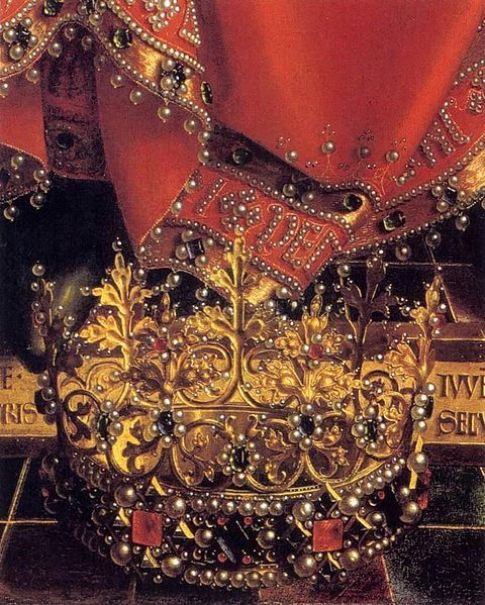On 24th December 1545, Henry VIII appeared before Parliament and made his final speech, where Henry mixes threats and flattery as he chastises the Lords and the Commons for the absence of religious unity in England and for some other things. Henry comes across as a belligerent and absolute monarch, who has control of every member of Parliament and who wields unrestricted political power over the sovereign state and his subjects.

The king didn’t arrive at Westminster with great grandeur and pomp, in all his royal splendour as he had always done in his youth. He wasn’t the same young handsome and athletic man, who had once been a young Renaissance Tudor prince and who had morphed into an overweight, paranoid, and capricious tyrant. In the last ten years of his life, Henry was plagued by headaches, recurrent fever, and some other illnesses; his weak, foul-smelling, and ulcerated legs could barely support him, which is why he was often carried in his chair around his palaces or from one place to another by his servants.

Despite all the troubles with his health and not looking as good as he did in his youth, Henry spoke with clarity and inspired awe in his subjects. This speech is given below as it was recorded by a member of Parliament.
“On 24 December the king’s majesty came into the parliament house, to give his royal assent to such acts as had been passed there, where the speaker made to him an eloquent oration, to which it has always been the custom for the lord chancellor to answer, but at this time it was the king’s pleasure that it should be otherwise, for the king himself answered, as follows word for word, as near as I was able to report it.
‘Although my Chancellor for the time being has been used, before this time, very eloquently and substantially to answer such orations as have been set forth in this high court of parliament, yet he is not so able to open and set forth my mind and meaning and the secrets of my heart in so plain and ample manner as I myself can. Wherefore, taking it upon myself to answer your eloquent oration, master speaker, I say that where you, in the name of our well beloved commons, have both praised and extolled me for the notable qualities which you have conceived to be in me, I most heartily thank you all that you have reminded me of my duty, which is to endeavor myself to obtain and get such excellent qualities and necessary virtues as a prince or governor should or ought to have, of which gifts I recognize myself both bare and barren. But for such small qualities as God has endowed me with I render to his goodness my most humble thanks, intending with all my wit and diligence to get and acquire for myself such notable virtues and princely qualities as you have alleged to be incorporated in my person. Having first remembered these thanks for your loving admonition and good counsel, I next thank you again because, considering our great charges (not for our pleasure but for your defense, not for our gain but to our great cost) which we have lately sustained, as well in defense against our and your enemies as for the conquest of that fortress which was to this realm most displeasant and noisome, and shall be by God’s grace hereafter most profitable and pleasant to our nation, you have freely of your own decision granted to us a certain subsidy, specified here in an act, which truly we take in good part, regarding more your kindness than the profit thereof, as he that sets more by your loving hearts than by your substance. Besides this hearty kindness I cannot a little rejoice when I consider the perfect trust and sure confidence which you have put in me, as men having undoubted hope and unfeigned belief in my good deeds and just proceedings for you, since without my desire or request you have committed to my order and disposition all chantries, colleges, hospitals and other places specified in a certain act, firmly trusting that I will order them to the glory of God and the profit of the commonwealth. Surely if, contrary to your expectation, I should suffer the ministries of the church to decay, or learning (which is so great a jewel) to be diminished, a poor and miserable people to be unrelieved, you might say that I, being put in so special a trust as I am in this case, were no trusty friend to you, nor a charitable man to my fellow Christians, nor a lover of the public wealth, nor yet one who feared God, to whom account must be rendered of all our doings. Doubt not, I pray you, that you expectations will be fulfilled more Godly or goodly than you will wish or desire, as you will plainly see afterwards.
‘Now, since I find such kindness on your part towards me, I cannot choose but to love and favor you, affirming that no prince in the world more favors his subjects than I do you, and no subjects or commons more love and obey their sovereign lord than I see you do me, for whose defense my treasure shall not be hidden, nor if necessity requires it will my person be not risked. But although I with you and you with me are in this perfect love and concord, this friendly amity cannot continue unless both you, my lords temporal, and you, my lords spiritual, and you, my loving subjects, study and take pains to amend one thing which is surely amiss and far out of order, which I most heartily require you to do, which is that charity and concord is not amongst you, but discord and dissension bears rule in every place. St Paul wrote to the Corinthians, in the 12th chapter: ‘Charity is gentle, Charity is not envious, Charity is not proud,’ and so on in that chapter. Behold then what love and charity is amongst you when one calls another heretic and anabaptist and he calls him back papist, hypocrite, and pharisee. Are these tokens of charity amongst you? No, no, I assure you that this lack of charity amongst yourselves will be the hindrance and assuaging of the fervent love between us, as I said before, unless this is healed and clearly made whole. I must judge the fault and occasion of this discord to be partly the negligence of you, the fathers and preachers of the spirituality. For if I know a man who lives in adultery I must judge him to be a lecherous and carnal person; if I see a man boast and brag about himself I cannot but deem him a proud man. I see and hear daily that you of the clergy preach against each other without charity or discretion. Some are too stiff in their old ‘Mumpsimus’, others are are too busy and curious in their new ‘Sumpsimus’. Thus almost all men are in variety and discord, and few or none truly and sincerely preach the word of God as they ought to do. Shall I now judge you to be charitable persons who do this? No, no, I cannot do so. Alas, how can the poor souls live in concord when you preachers sow amongst them in your sermons debate and discord? They look to you for light and you bring them darkness. Amend these crimes, I exhort you, and set forth God’s word truly, both by true preaching and giving a good example, or else, I, whom God has appointed his vicar and high minister here, will see these divisions extinct, and these enormities corrected, according to my true duty, or else I am an unprofitable servant and an untrue officer’. ….”

In the end of his speech, the king appealed to everyone in attendance and implored them to remember the true meaning of God’s words, to treat each other like brothers, and to love and serve God that he represented on earth:
“I am very sorry to know and hear how unreverently that most precious jewel, the word of God, is disputed, rhymed, sung, and jangled in every alehouse and tavern, contrary to the true meaning and doctrine of the same; and yet I am even as much sorry that the readers of the same follow it, in doing, so faintly and coldly. For of this I am sure, that charity was never so faint amongst you, and virtuous and godly living was never less used, nor was God himself, amongst christians, never less reverenced, honoured, or served. Therefore, as I said before, be in charity one with another, like brother and brother; love, dread, and serve God (to the which I, as your supreme head, and sovereign lord, exhort and require you); and then I doubt not, but that love and league, which I spoke of in the beginning, shall never be dissolved or broken between us. And, as touching the laws which be now made and concluded, I exhort you, the makers, to be as diligent in putting them into execution, as you were in making and furthering the same, or else your labour shall be in vain, and your commonwealth nothing relieved.”

Although my personal opinion about Henry VIII’s reign is quite low and although I have always considered him a narcissistic and spoiled sociopath, I have to say that I admire Henry for making this wise and heart-touching speech that seems to be a hearty appeal of his soul to the warring factions to put aside their differences and work together for the greater good of England.
I think that there is a sort of symbolism in this speech as it was made on Christmas Eve and, thus, was associated with the birth of Christ, though Henry probably associated it more with the birth of the new age for England that would be ruled by Prince Edward, his young heir and his only surviving son.




